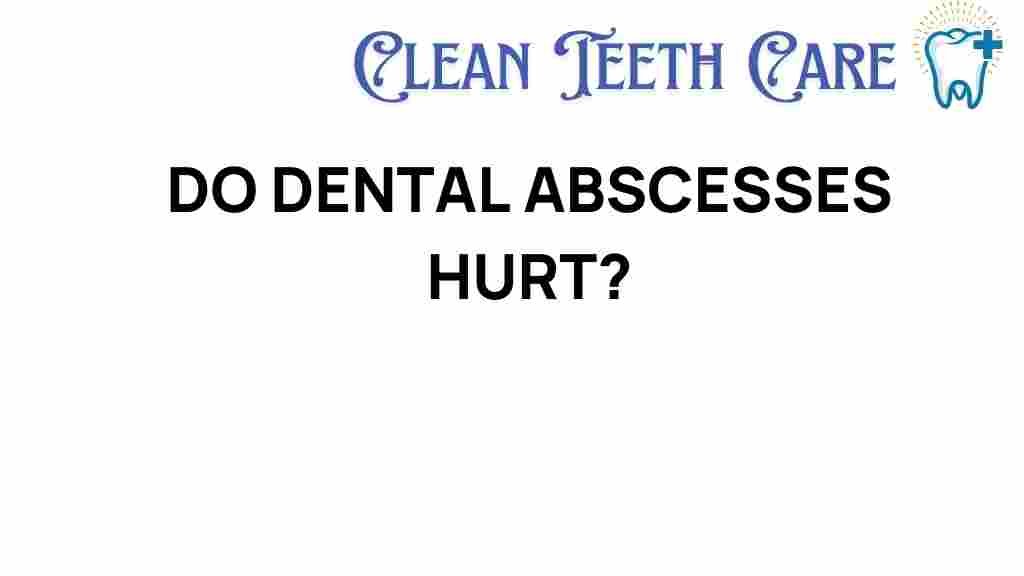Unveiling the Pain: Do Dental Abscesses Hurt More Than You Think?
Dental abscesses are more than just a minor inconvenience; they can lead to severe pain and significant oral health issues if left untreated. Understanding dental abscesses, their symptoms, treatment options, and preventive measures is crucial for maintaining good oral health. This article will delve into the world of dental abscesses, exploring their causes, the pain they inflict, and how to manage and prevent them effectively.
What is a Dental Abscess?
A dental abscess is a localized infection that occurs in the tooth, gums, or bone surrounding a tooth. This infection often results in a pocket of pus that can cause significant discomfort and pain. Dental abscesses typically arise from untreated tooth decay, gum disease, or trauma to the tooth. The infection can lead to serious complications if not addressed promptly.
Symptoms of Dental Abscesses
Recognizing the symptoms of a dental abscess is crucial for timely treatment. Common symptoms include:
- Throbbing Tooth Pain: The pain associated with a dental abscess can be severe and often feels like a throbbing sensation. This pain may radiate to the jaw, neck, or ear.
- Swelling: Swelling in the gums, face, or jaw is common and may accompany the pain.
- Redness: The affected area may appear red and inflamed.
- Fever: A fever may develop as the body fights the infection.
- Bad Breath: An unpleasant odor from the mouth can occur due to the presence of pus.
- Difficulty Swallowing or Breathing: In severe cases, the swelling can make swallowing or breathing difficult.
If you experience any of these symptoms, it’s essential to seek dental care promptly, as delaying treatment can lead to more severe complications.
Causes of Dental Abscesses
Understanding the causes of dental abscesses is vital for prevention. The primary causes include:
- Untreated Tooth Decay: Cavities that are left untreated can progress to an abscess.
- Gum Disease: Infections in the gums can lead to abscess formation.
- Trauma to the Tooth: Any injury that damages the tooth can increase the risk of infection.
- Pre-existing Dental Issues: Conditions like cracked teeth or previous dental work can also lead to abscesses.
Treatment Options for Dental Abscesses
Treating a dental abscess effectively is crucial to alleviating pain and preventing further complications. The treatment options include:
1. Drainage of the Abscess
The first step in treating a dental abscess is often to drain the pus. This procedure is typically performed by a dentist, who will numb the area and make a small incision to allow the pus to escape. This process can provide immediate relief from pain and pressure.
2. Antibiotics
In most cases, antibiotics are prescribed to help clear the infection. It’s important to complete the entire course of antibiotics as directed, even if symptoms improve before finishing the medication.
3. Root Canal Treatment
If the abscess is associated with an infected tooth, a root canal may be necessary. During this procedure, the dentist removes the infected pulp from the tooth, cleans the interior, and seals it to prevent future infections.
4. Tooth Extraction
In severe cases where the tooth is too damaged to save, extraction may be the only option. The dentist will remove the tooth and may recommend further treatment to prevent future issues.
5. Pain Management
Over-the-counter pain relievers can help manage pain associated with a dental abscess. Non-steroidal anti-inflammatory drugs (NSAIDs) like ibuprofen or acetaminophen can be effective. Always consult your dentist before taking any medication.
Preventing Dental Abscesses
Preventing dental abscesses is key to maintaining good oral health. Here are some effective prevention strategies:
- Regular Dental Check-ups: Visit your dentist at least twice a year for cleanings and check-ups. Early detection of dental issues can prevent abscess formation.
- Maintain Good Oral Hygiene: Brush your teeth at least twice a day and floss daily to remove plaque and food particles.
- Healthy Diet: Limit sugary foods and drinks that can contribute to tooth decay. A balanced diet rich in vitamins and minerals supports oral health.
- Use Fluoride: Fluoride helps strengthen tooth enamel and can reduce the risk of cavities.
- Address Dental Issues Promptly: If you notice any problems with your teeth or gums, seek dental care immediately to prevent complications.
Troubleshooting Dental Pain
If you experience tooth pain, it’s essential to determine the cause. Here are some troubleshooting tips:
Identify the Source of Pain
Try to pinpoint where the pain is coming from. Is it a specific tooth, or does it feel more generalized? Understanding the location can help your dentist diagnose the issue more effectively.
Monitor Symptoms
Keep track of any additional symptoms, such as swelling, fever, or bad breath. This information will be helpful when you consult with your dentist.
Over-the-Counter Pain Relief
Use over-the-counter pain relievers as needed, but do not rely on them as a long-term solution. They can help manage discomfort temporarily.
Contact Your Dentist
If pain persists or worsens, contact your dentist. Delaying treatment can lead to more severe complications and prolonged pain.
Conclusion
Dental abscesses can cause more pain than many people anticipate, and understanding their symptoms, causes, and treatment options is crucial for maintaining good oral health. By practicing preventive measures and seeking prompt dental care, you can significantly reduce your risk of developing a dental abscess. Remember, your oral health is interconnected with your overall health, so prioritizing dental care is essential.
For more information on maintaining oral health, visit the American Dental Association’s website.
If you’re experiencing tooth pain or symptoms of a dental abscess, don’t hesitate to schedule an appointment with your dentist today. Your smile deserves the best care!
This article is in the category Conditions and created by CleanTeethCare Team
